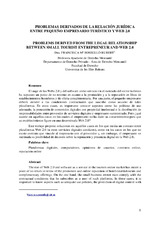Problemas derivados de la relación jurídica entre pequeño empresario turístico y web 2.0
Problems derived from the legal relationship between small tourist entrepreneur and web 2.0
Autor
Rosselló Rubert, Francisca Mª
Editor
UCOPressFecha
2018Materia
Plataformas digitalesComparadores
Opiniones de usuarios
Contratos online
Reputación online
Digital platforms
User reviews
Small business
Online contracts
Online reputation
METS:
Mostrar el registro METSPREMIS:
Mostrar el registro PREMISMetadatos
Mostrar el registro completo del ítemResumen
El auge de las Webs 2.0 y del software como servicio en el mercado del sector turístico ha supuesto un punto de no retorno en cuanto a la promoción y a la reputación en línea de establecimientos hosteleros y de oferta complementaria. Por una parte, el pequeño empresario deberá atender a las condiciones contractuales que suscribe como usuario de tales plataformas. En estos casos, es importante conocer aspectos como las políticas de uso adecuado, la protección de contenidos digitales con propiedad intelectual o la distribución de responsabilidades entre proveedor de servicios digitales y empresario suministrado. Pero ¿qué sucede en aquellos casos en los cuales el empresario no ha dado su consentimiento para que su establecimiento figure en una determinada Web 2.0? Este trabajo propone soluciones en aquellos casos en los que media un contrato entre plataformas Web 2.0 (u otros servicios digitales similares), como en los casos en los que no existe contrato que vincule al empresario con el proveedor y, sin embargo, el empresario ve mermada su posibilidad de decisión sobre la reputación y presencia digital en la Web 2.0. The rise of Web 2.0 and software as a service in the tourism sector market has meant a point of no return in terms of the promotion and online reputation of hotel establishments and complementary offerings. On the one hand, the small business owner must comply with the contractual conditions that he subscribes as a user of such platforms. In these cases, it is important to know aspects such as adequate use policies, the protection of digital content with intellectual property or the distribution ofres ponsibilities between the digital service provider and the entrepreneur supplied. But what happens in those cases in which the employer has not given his consent for his establishment to appear in a certain Web 2.0? This work proposes solutions in those cases in which there is a contract between Web 2.0 platforms (or other similar digital services), such as in cases where there is no contract linking the employer with the provider and yet the employerse es reduced its possibility of decision on the reputation and digital presence in Web 2.0.

